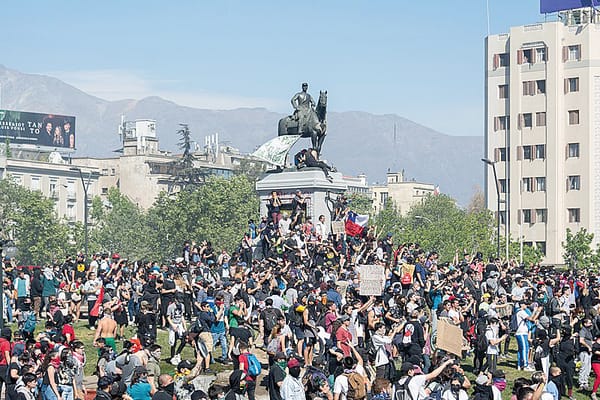Flag Patriotism: Vox in the November elections and the Rise of the Far Right in Spain
An analysis on the origins and nature of Spain’s far-right party and how it has become a strong political force

Some political scientists argue that the far right comes in “waves”, and that Europe is currently being swept up by one of them. Most European countries have witnessed the rise (and sometimes fall) of parties representing this radical mindset in the last century; but Spain has been an exception, or so it seemed. After the Spanish general election on the 10th of November, Vox, Spain’s own far right force, has established itself as the third strongest parliamentary force with fifty-two deputies out of three hundred and fifty. This unexpected outcome surely invites an analysis.
But first, some historical context:
To give politico-historical context, we must first discuss Franco’s dictatorship. In 1936, a small group of Spanish generals led a rebellion against the Republic of Spain. Support from Mussolini and the Nazis to the generals led the rebellion to evolve into national civil war, and due to an international no intervention agreement to assist the Republic, the rebels won the war in 1939. Immediately after, a personalist dictatorship in the figure of Francisco Franco was established.
Francoism (the ideology of Franco’s regime) can be divided into two phases. The early phase of Francoism was close to the Italian fascist ideology and an interventionist autarchic economy: a self-sufficient economy regulated by the State, refusing to trade with external agents. During the fall of the Axis powers, Francoism began to distance itself from European fascism in order to survive, and more change was caused by pressure placed on the Spanish economy by post-war conditions and the trade blocks imposed by European economies due to the regime’s dictatorship. Late Francoism was then developed in parallel with the Cold War, when Spain was one of few remaining dictatorships in the Western world; this isolation gave it a unique character.
Francoism exchanged their fascist values for nationalist Catholic ones and started to transition Spain into a liberal economy; their new ideology represented a turn back to conservative monarchic ideologies of the previous decades. With these changes, and taking into consideration Spain’s strategic geographic and military position in the Cold War and the “anti-communist” nature of the regime, Western forces (France, the UK, the US…) tolerated late Francoism and allowed it to join the Western bloc against the USSR. In the early 1970s, Franco’s last years, he enacted a law to transition Spain into a parliamentary monarchy after his death. Western approval and the fact that Spanish democracy was inherited from Franco himself has resulted in the tolerance, to some extent, of Francoism up to our days.
Now back to Vox - the first question that needs answering is where they come from. Vox was founded by the more conservative section of the right wing party Partido Popular (PP). This excision was caused by the disenchantment with PP’s policies and cases of corruption within the party, and a belief that the party had lost their ideals to political correctness. Many of their members, therefore, already had political careers in PP, but what’s more interesting is the section of the population they represent. PP is a party whose political history goes back to the transition from the dictatorship to democracy, and was originally formed by ex-members of the Francoist regime. This inheritance has dissolved over the years within the party’s structure, but PP remains the party for voters nostalgic of the social conditions of late Francoism. With their origins understood, we can now discuss its role in the political landscape.
Vox’s discourse is centred around these main points: traditionalist ultra-nationalism, territorial unity of Spain, anti-immigration, and euro-skeptic liberalism. The main cohesive element of their ideology is an idea of patriotism associated to pride in the Spanish flag and archaic, Catholic traditions such as bullfighting, the monarchy, and religious celebrations. These are implied to be the virtuous values of Spaniards; their exaltation and defence are the duties of any “patriot”. This manipulation of concepts allows them to define “enemies of the nation” just as easily, and included in this category are independence activists and socially progressive collectives. Their immigration policies are based on propaganda that immigrants take resources from “patriots” and speeches of terror against certain groups such as Muslims. They support a liberal economy and tax reductions to both big and small companies, but they take a more interventionist stance when it comes to international commerce, which is reinforced by their euro-skepticism. This skepticism, though, is based less on disagreement with the EU’s liberal economy and more on cultural values, immigration policies, and the secondary role they claim Spain has in the EU.
The question of how it became a force to be reckoned with still remains. As discussed, the prevalence of neo-late Francoist tolerance in society made it so that Vox did not have to introduce their ideas as new or original, because they were already present, but just did not have a party that represented these views. Vox presented itself as the party that would give a voice to these ideas. But the fact that its discourse was normalised and already appealed to a small sector of society is not all that explains their rise. The catalyst for Vox’s success was media coverage: even before they had parliamentary representation, Vox was depicted by the media as a political force to watch. This exposure allowed party members to preach their speech of terror, and in many cases allowed them to fabricate fear about issues that were not previously regarded as worrying. Examples of this are their concerns for mass illegal immigration and the cultural adaptation capacity of legal immigrants, or their support of legalising use of weapons for household defence. As they were the ones bringing these topics into political discourse, they were also the only ones offering solutions to them, convincing citizens to vote for them. After elections on the 28th of April, Vox became a parliamentary force with twenty-four seats. With the prospect of a left coalition government, it was believed that those elections would be the peak of the far right wave in Spain; but no such government was formed, and second elections were convoked.

Vox, with newfound parliamentary presence and a definite seat on the debate table, was gaining even more media time after April. Vox’s speech is characterised by a direct, down to earth style, which gives the public a sense of certainty and security that is often valued by the Spanish electorate. As a means to diminish their importance, other parties had attempted to ignore them and avoided directly challenging their views, hoping to present an attractive false impression of their own strength.But in the past November elections, as potential voters realised that Vox had become a well established party in parliament with enough representation to push forward their changes in practice, some indecisive PP advocates decided to join the far right formation this time round. They gained the seats of 28 more deputies to win a total of 52. A large source of these votes are from the centre-right party, Ciudadanos, who lost most of their political presence because of their ideological indecisiveness. The difference between these two parties is considerable, but many voters who hold anti-PP attitudes, because of the party’s internal corruption cases, no longer saw an alternative in Ciudadanos and joined Vox instead. Lastly, the revival of the Catalonian issue just before the elections, made many voters who do not want to see an independent Catalonia turn their head to Vox, as they support the strongest measures against independence.
In conclusion, Vox, a heritage party of Franco’s dictatorship, was formed out of the normalisation of Francoism and has taken advantage of their abundant media coverage to preach previously non-existent issues to which they offer firm solutions to, stealing votes from both centre and right and against all odds, consolidated itself this November as one of the strongest far rights in Europe.
Is Vox Fascist?
These characteristics usually classify Vox as a far right party, but are claims of them being fascist reasonable? Broadly, the historical evolution of the word fascism suggests that it designates ideologies that preach mythical values (ethnicity, nationality, family line…) that make those possessing them intrinsically superior to those who do not. These mythical fetishes are then adapted to the political system (western democracy) in order to acquire political power. In this sense it could be argued that Vox’s idea of patriotism serves this role, making it a fascist party in the modern sense.
More importantly, though, Vox’s ideology is the modern heritage of late Francoism. Francoism, tolerated by Europe, survived in many Spanish households and adapted to our current democracy, whilst neo-late Francoism also made its way through the years in PP and culminated in the creation of Vox. This explains their traditional values over classic historical fascism. As Vox remains a direct descendant of the nostalgia for dictator Franco, a better description of Vox than fascism would perhaps be neo-late Francosim.








